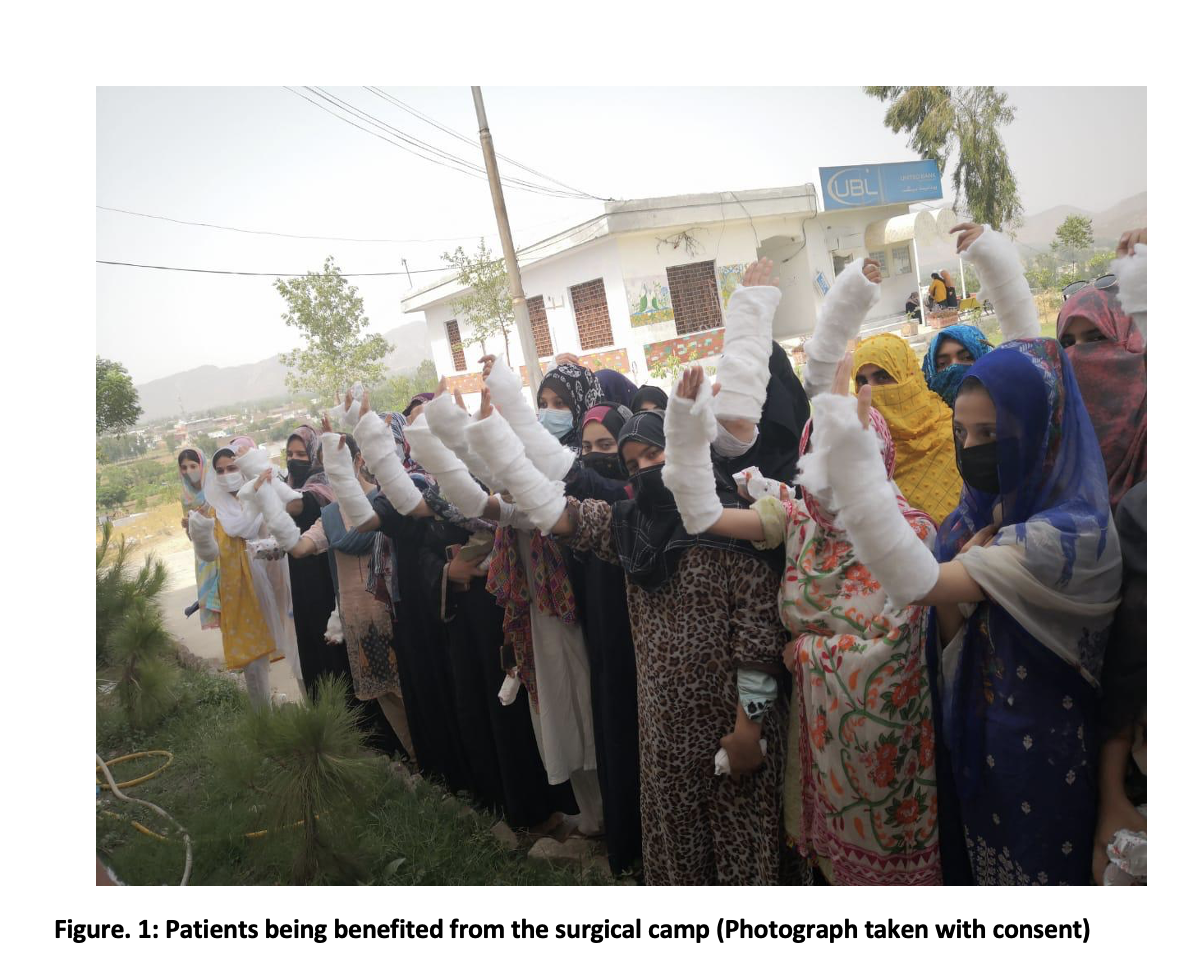By Mahnoor Amin1
- Civil Hospital, Karachi, Pakistan.
DOI: https://doi.org/10.36283/PJMD12-4/018
How to cite: Amin M. Scalpel and Scenery: A Surgical Camp Experience in the Valleys of Chitral. Pak J Med Dent. 2023;12(4): 94-95. Doi: 10.36283/PJMD12-4/018
Chitral, found in the mountains of the Hindu Kush is a landlocked area. It faces numerous health problems which are exacerbated by its geography, the harsh climate, and lack of both healthcare infrastructure and professionals1. Data are scarce on health-related outcomes for Chitral, which results in challenges when forming targeted and effective health policies2.
In low-resource and remote areas similar to Chitral, surgical camps have been demonstrated to be an integral part of healthcare delivery. In June 2022, I participated in a surgical camp in Chitral, organized by the Kohi Goth Welfare Hospital. I was accompanied by medical students and doctors from across Pakistan and around the world – including professionals from Canada, the UK, and the USA. This four-day camp aimed to provide consultation and surgical care in a broad variety of specialties: gynaecology and obstetrics, orthopedics, psychiatry, diabetology, and physical rehabilitation.
After a long journey from Karachi to Islamabad, we passed through mountainous terrain and through the longest Lowari tunnel to arrive in Chitral. Beautiful scenery and a humble breakfast awaited us the following morning to relieve our fatigue. On the first day of camp, students were assigned to different doctors and were set out to attend the outpatient department.
In gynaecology, OPD a wide variety of cases ranging from primary amenorrhea, infertility, heavy menstrual bleeding, and vaginal prolapse to advanced malignancies were seen. As the day went by in the OPD, a dire need was felt to create awareness regarding menstrual hygiene, infertility causes, and self-examination of breast cancer in the local population. A lack of awareness and societal taboos meant that women were presenting late in their conditions where medical or surgical intervention was not of much use.
Other specialties also had busy day consulting. A memorable and rewarding case in orthopaedics was a matric student with an elbow fracture. His fracture was reduced and he was elated that he could appear in his exams the following week. Our second day was in gynaecology surgery and we had the opportunity to scrub in for the procedures. We had hands-on experience in preparing patients for surgeries as well as administering spinal anaesthesia. I performed my first subcutaneous stitches in a case of abdominal hysterectomy.
Under supervision from our senior doctors, we examined patients in Chitral and the surrounding areas on the roadside with spot diagnosis. Several musculoskeletal and limb defects were diagnosed on the spot as well, providing evidence of the increased incidence of such findings in the area3. It was a privilege for us medical students to learn from experienced surgeons around the world, being taught to examine a leg amputation or a gynaecology complaint to diagnose the commonly attributed ailments in this regard.
Hundreds of patients attended the camp. They had consultations with specialists, were diagnosed, and were given treatments, including surgical intervention (Figure 1). In addition to medical and surgical management, several educational sessions were organized. These included workshops on genital tract fistula for midwives, basic life support, and hand hygiene sessions for paramedics and nursing staff.
During our time volunteering at this surgical camp, we noted the effects scarcity of health care has on a population. Our experience was in keeping with previous literature: surgical camps in remote areas are beneficial not only to patients but also to the healthcare professionals working there. This is especially true of medical students, whose experience in low-resource settings of surgical camps equips them with skills and confidence that are useful throughout their careers4. It is deemed important to have such camps integrated into medical students’ journeys to instil a feeling of gratitude and a sense of responsibility and accountability which is in itself pertinent to this profession.
The author would like to acknowledge and extend their gratitude to the institution.
There is no conflict of interest.
MA contributed to manuscript writing and editing.
- Shinwari SA. Chitral health services are marred by staff shortages. Dawn 2018.
- Community Response to Climatic Hazards in Northern Pakistan. Mountain Research and Development. 2007;27(4):308-312, 5.
- Ullah S, Dasti JI, Malik S. Descriptive epidemiology of hereditary musculoskeletal and limb defects in the isolated population of Chitral, North-West Pakistan. Pakistan journal of medical sciences. 2015;31(5):1047-1052. doi: 10.12669/pjms.315.7594
- Parekh Y, Romeo P, Baskar D, Chandra A, Filtes P, Varghese B, et al. Orthopedic Surgery Boot Camp: An Immersion Course for Medical Students. Cureus. 2022;14(5):e24806. doi: 10.7759/cureus.24806.

This is an open-access article distributed under the terms of the CreativeCommons Attribution License (CC BY) 4.0 https://creativecommons.org/licenses/by/4.0/
